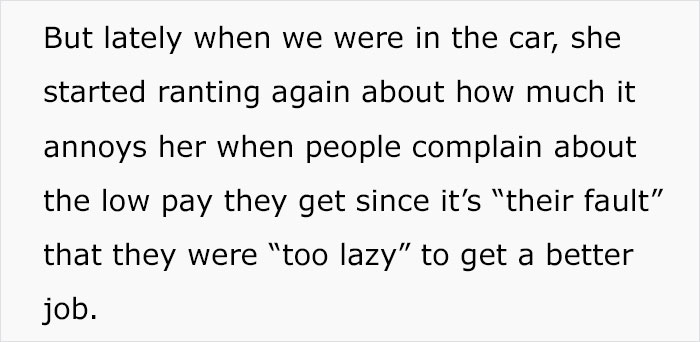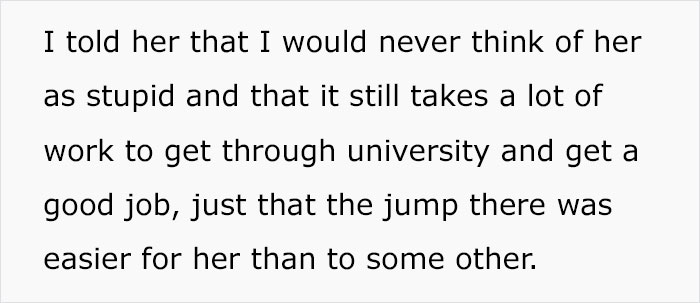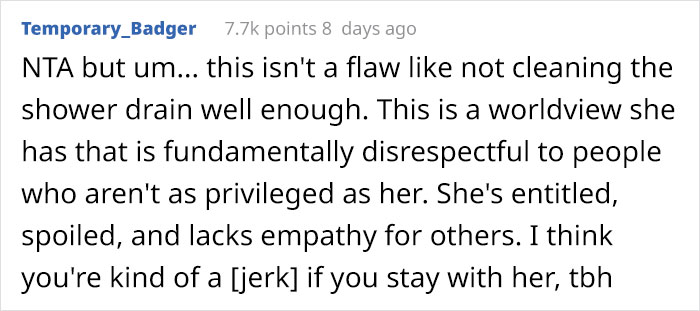
Ivy League Girlfriend Looks Down On Lower-Pay Workers, Gets Reminded How Privileged She Is By Partner And Causes A Scene
Our achievements are a huge part of our personality. Try to take them away from us and we’ll view it as an attack against our very core. However, if someone inflates their victories—even worse, uses them to disrespect others—they’re just asking to be brought down to reality.
And that’s exactly what one woman did to her girlfriend who started judging less fortunate people and labeling them as lazy. But eventually, the whole thing turned into a huge fight, and now she isn’t sure if she should apologize or wait for her partner to do it.
Trying to navigate the situation, the woman told her story to the subreddit “Am I The A***ole?“, asking its members to help her make sense of the entire ordeal.
Image credits: bowie15 (not the actual photo)
Adam Howard, Ed.D., who is the Charles A. Dana Professor of Education and Chair of Education Program at Colby College, thinks we can’t completely separate our achievements from privilege.
“Privileged people often want to claim that their achievements/successes are gained through their own merits,” Howard told Bored Panda. “To convince others (and even themselves) that they deserve their achievements, privileged people will claim that their advantages in life have had no role in those achievements. That is just not the case. Yes, they may be hard workers and really smart and make really solid decisions that all lead to their achievements. But this doesn’t mean that their privilege hasn’t had a role in their success/achievements. They’ve had advantages that others have not had. It’s unavoidable – their advantages have played some role in their achievements. Oftentimes, they played a big role.”
Of course, it doesn’t mean that OP’s girlfriend is hopelessly lost for life. She can still learn and grow. However, according to Howard, gaining awareness of our own privilege requires a lot of effort because “privilege is anesthetizing.”
“When you’re privileged, the world around you is structured to conceal how your privilege is benefiting you,” the author of Educating Elites: Class Privilege and Educational Advantage explained. “You aren’t put in the position to be aware of the ways in which you’re placed at an advantage, often at the expense of others. Advantages oftentimes remain invisible to those who benefit from them. So, it takes effort to develop the habits of heart and mind to be conscious of those advantages.”
“You can’t attend a one-off workshop or training and tell yourself that suddenly you’ve built the capacity to be mindful/aware of your privilege. It’s an ongoing process,” Howard said. “But we begin to gain awareness of privilege by identifying our unearned advantages (those advantages we enjoy that others don’t have) and how those advantages relate to other people’s disadvantages. People have to make their advantages less taken for granted and more visible. Not easy to do but essential to acknowledge.”
So far, it sounds like our Harvard graduate isn’t able to look at herself from a neutral point of view.
Howard believes there are at least a few reasons why it’s so difficult for some people to even discuss privilege with others.
“First, privilege means different things to different people,” he highlighted. “There is no one common understanding for the concept. But people use it to speak to all sorts of individual and group advantages. Because of that, it’s a slippery concept. We don’t have the common language to engage in meaningful and productive conversations about privilege.”
“Another reason (and in my view, the most important reason for this difficulty) is that people’s advantages powerfully influence their understandings of self and others,” Howard added.
“For example, their advantages have afforded them particular opportunities and experiences that have shaped their sense of self – who they are. We often don’t pay enough attention to the intrinsic aspects of privilege. But it’s important to emphasize the relationship between privilege and identity.”
Howard thinks privilege is a difficult topic because it speaks directly to how people understand who they are. A lot is at stake here. Especially for those who cherish their ego. “If a privileged person has enjoyed a lot of success in life, they often want to think that is achieved through their own merits – not because there are various scales in their lives that are tipped in their favor,” Howard said.
People thought it was the girlfriend who was in the wrong
Then there’s money. It represents so much in our society: we often use it to measure power, security, experiences, and, in this case, even people.
“Money is so fraught,” George Loewenstein, a professor of economics and psychology at Carnegie Mellon University in Pittsburgh, told USA TODAY. “[But] it’s how we keep score.”
People who are prone to judge may be masking their own money doubts and fears—shaming draws a line between them and those who are open about their struggles.
“A lot of times the loudest and most judgmental are camouflaging insecurities,” Kit Yarrow, a consumer psychologist and professor emerita at Golden Gate University in San Francisco, explained in the same publication. “The people who are shaming are often not super happy people.”
So maybe OP’s girlfriend is actually not that confident about her status? Maybe, even if it’s internal, she understands that important things in her life are there due to her wealth, so if someone or something stripped it away, her world could crumble?
At this point, you might be wondering how the couple can resolve their conflict. It’s hard to find the answer when we don’t have the full picture, but one thing is certain. A little empathy could go a long way.
Nathan Astle, a student board member of the Financial Therapy Association, believes a good way to start such a dialogue for the judger and judged is to try and understand how each other’s relationship with money differs and appreciate that people face many financial situations and tough trade-offs.
“Once people understand that money choices reflect deeper values, traumas, and life stories, they may see that a financial need for me may not be the same thing it is for you,” he said.
That can help dispel the idea that people without money or who are bad with finances are “lazy” and have only themselves to blame.
Explore more of these tags
Disrespecting people with lower status/income is a fatal flaw as far as I am concerned. I'd end any kind of relationship with a person like that.
She has the "bad trait" of disrespecting people with lower income - "but she's great"...um, yeah, no, she's not...
The person who commented in the original post that the entitled one may have imposter syndrome was dead on. She interpreted that she said she wouldn't be anywhere without her father. It hit a hot button because deep down she knows it's true. She worked hard in Harvard, etc., but she got there by her father pulling some strings. Same thing with her job. Sometimes the truth hurts. It's awful to treat service staff poorly. There by the grace of God go I.
Exactly. Which is why I think telling him to break up with her over it betrays just as much a lack of empathy as these people are accusing her of.
Load More Replies...courtesy of Disney's Aladdin: ""If I were as rich as you, I could afford some manners!""
Bottom line: Sometimes it's better to be single than to be with certain people.
"Destruction of her self conception" sounds like a much needed growth opportunity.
I want to write a children's book "Why you can't be an astronaut". Basically out lining the differing types of privilege in the world and how it can and does change your experiences. Like if you want to be high ranking officer in the military you need more than work ethic and would need to already be with ties to existing offices possibly through A program like West Point which oddly enough means they can outrank many active serviceman. That and higher learning institutions (ivy league) are often used as social connections that you as a normie just won't have access to. Even so called self made millionaire(billionaire with inflation) often had resources that most would never have(dad who paid for everything because he owns an emerald mine). That basically in the end it's just dumb luck when conditions line up for someone to get on the other side of the glass ceiling that wasn't given a keycard by birth
Nothing they said has anything to do with working hard they are saying some people don't have to shave years off there lifespan or health to pay for stuff or get stuff others get for free and BTW a American born to two foreigners with high enough grades for ivy league is a sure in the goverment incentives it while there are only so many spots for other ppl who basically have to know what the ivy leagues schools are supposed to teach just to get that spot so the school pretty much has guaranteed graduates -justin
Load More Replies...Here is the problem I see...you know she treats lower-income or staff like dirt, yet you've stayed with her for 4 years. She got shuttled into her current career by daddy, yet she calls other people lazy instead of recognizing the opportunities that were handed to her on a silver platter. So why are you staying with her? Because you have four years invested? Because she's rich? How long before she sees you as nothing more than an accessory. How long before her friends convince her to ditch you. Don't expect her to change just because you called her on it. I think there are better girlfriends out there than her. Get out while you can.
Disrespecting people with lower status/income is a fatal flaw as far as I am concerned. I'd end any kind of relationship with a person like that.
She has the "bad trait" of disrespecting people with lower income - "but she's great"...um, yeah, no, she's not...
The person who commented in the original post that the entitled one may have imposter syndrome was dead on. She interpreted that she said she wouldn't be anywhere without her father. It hit a hot button because deep down she knows it's true. She worked hard in Harvard, etc., but she got there by her father pulling some strings. Same thing with her job. Sometimes the truth hurts. It's awful to treat service staff poorly. There by the grace of God go I.
Exactly. Which is why I think telling him to break up with her over it betrays just as much a lack of empathy as these people are accusing her of.
Load More Replies...courtesy of Disney's Aladdin: ""If I were as rich as you, I could afford some manners!""
Bottom line: Sometimes it's better to be single than to be with certain people.
"Destruction of her self conception" sounds like a much needed growth opportunity.
I want to write a children's book "Why you can't be an astronaut". Basically out lining the differing types of privilege in the world and how it can and does change your experiences. Like if you want to be high ranking officer in the military you need more than work ethic and would need to already be with ties to existing offices possibly through A program like West Point which oddly enough means they can outrank many active serviceman. That and higher learning institutions (ivy league) are often used as social connections that you as a normie just won't have access to. Even so called self made millionaire(billionaire with inflation) often had resources that most would never have(dad who paid for everything because he owns an emerald mine). That basically in the end it's just dumb luck when conditions line up for someone to get on the other side of the glass ceiling that wasn't given a keycard by birth
Nothing they said has anything to do with working hard they are saying some people don't have to shave years off there lifespan or health to pay for stuff or get stuff others get for free and BTW a American born to two foreigners with high enough grades for ivy league is a sure in the goverment incentives it while there are only so many spots for other ppl who basically have to know what the ivy leagues schools are supposed to teach just to get that spot so the school pretty much has guaranteed graduates -justin
Load More Replies...Here is the problem I see...you know she treats lower-income or staff like dirt, yet you've stayed with her for 4 years. She got shuttled into her current career by daddy, yet she calls other people lazy instead of recognizing the opportunities that were handed to her on a silver platter. So why are you staying with her? Because you have four years invested? Because she's rich? How long before she sees you as nothing more than an accessory. How long before her friends convince her to ditch you. Don't expect her to change just because you called her on it. I think there are better girlfriends out there than her. Get out while you can.

 Dark Mode
Dark Mode 

 No fees, cancel anytime
No fees, cancel anytime 











































































118
127